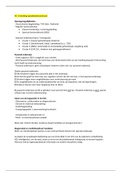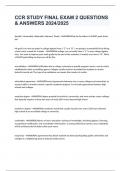Overig
Exam cheat sheet - Economics of Entrepreneurship
- Instelling
- Universiteit Utrecht (UU)
Document contains the double-sided cheat sheet for the exam of Economics of Entrepreneurship for the year 2022/2023 in Utrecht University. All articles are sorted by week. Additional information from the tutorials and lectures have also been added. When you print it, margins should be set to the sm...
[Meer zien]














